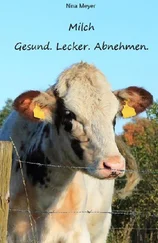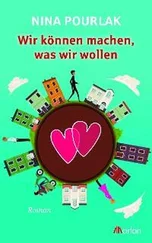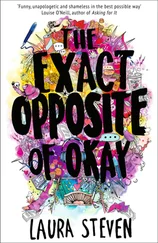“They’re already buying stuff for the baby. Everything is gender neutral because it’s going to be a surprise.”
I think of Mabel and her little niece or nephew. About her traveling to Uruguay to meet this new life. And watching a person grow, from inside a round belly, to a baby, to a kid who can tell her things. I think of Ana and Javier, so excited, remembering who they were when Carlos was young.
I almost gasp.
I don’t know if I’ve ever thought this way about the expansiveness of a life. I think about it as it is in the wider world—in nature and time, in centuries and galaxies—but to think of Ana and Javier being young and in love, having their first baby, and watching him grow up, get married, move across the world. Knowing that they’ll soon have another descendant to love. Knowing that they’ll grow older as time passes, they’ll become old the way Gramps was, with gray hair and a tremble in his step, so much love still in their hearts—this astonishes me. I am capsized.
Despite the sweetness of the news, loneliness, bottomless and black, rushes in.
I want to know what Gramps felt when he learned my mom was pregnant. She was young, and the boy wasn’t in the picture, but surely, Gramps must have felt some gladness in spite of it. I wonder if, once the shock passed, he whooped and danced at the thought of me.
She tells me more about Carlos and Griselda’s plans, what the due date is, what names she likes.
“I’m making lists,” she says. “I’ll read them to you. I mean, I’m sure they’ll come up with their own but what if I find the perfect name?”
I’m trying to stay here with her in her happiness.
“I’d love to hear them,” I say.
“Oh no!” she says, pointing.
The chili got too hot—it’s bubbling and spilling over. We turn it down to a simmer. The corn bread still has twenty minutes to go.
I listen to her ideas about nurseries and what she’ll do in lieu of a baby shower since she won’t be able to travel that far during the spring semester. I last as long as I can, I do, I just can’t shake the loneliness.
So when there’s a break in the conversation, when it seems like the topic of her niece or nephew has passed, I sit at the table and she sits across from me.
“You said he was cute,” I say. “Gramps was.”
Her brow furrows. “I apologized for that.”
“No,” I say. “ I’m sorry. Tell me again.”
She looks at me.
“Please.”
She shrugs.
“He was just . . . always doing these adorable things. Like polishing those candlesticks. Who does that?”
He would sit at the round table in the kitchen, humming along with the radio, shining the brass until it shone.
“And playing cards with his friends all day, like it was their job or something, saying it kept his mind sharp when really it was about drinking whiskey and having company, right? And winning money?”
I nodded. “He won more often than the others. I think that’s how he sent me here. A couple decades of winning at small-stakes poker.”
She smiles.
“All of those sweets he made. How he loved when I spoke Spanish, and the songs he sang, and the lectures he gave us. I wish we had listened better. I feel like there was so much more we could have learned from him.” She shoots me a quick glance and says, “At least I could have learned so much more. I don’t want to speak for you.”
“No,” I say. “I’ve thought of that, too. It was impossible to know what the subject of the lecture would be until he started it. And some of them felt so random at the time, but maybe they weren’t. Once, he did a three-day series on stain removal.”
“Like, for laundry?”
“Yeah, but with lots of variations. It went beyond clothes. How to get a stain out of a carpet, when to use fizzy water and when to use bleach, how to test to see if the colors would bleed.”
“Amazing.”
“Yeah, but I really learned it. I can get stains out of anything.”
“I’ll keep that in mind,” she says. “Don’t be surprised if you get packages of my laundry.”
“What have I started?”
We smile; the joke settles.
“I miss his face,” Mabel says.
“Me, too.”
The deep lines by his eyes and mouth, in the center of his forehead. His short, coarse eyelashes and ocean-blue eyes. His nicotine-stained teeth and his wide grin.
“And how he loved jokes,” she says, “but always laughed the hardest at his own.”
“It’s true.”
“There are so many other things, too, that are harder to put into words. I could try, if you want me to.”
“No,” I say. “It’s enough.”
I stop my mind from taking me back to that last night and my discoveries. Instead, I play each thing that Mabel said over and picture them all, one by one, until they turn into other memories, too. How it sounded when he walked the hall in his plaid slippers, how clean and short he kept his fingernails, the low rattle of his throat clearing. A soft glow settles in, a whisper of what used to be. It fends off some of the loneliness.
And then I think of something else Mabel said.
“Why were they clearing out Carlos’s room?”
She cocks her head.
“For you. I already told you they redid it.”
“But I thought you meant the guest room.”
“That room is tiny. And it’s for guests .”
“Oh,” I say. A mechanical ding blares. “I guess I just assumed . . .”
The ding repeats. It’s the oven timer. I’d almost forgotten where we were. I don’t know what I’m trying to say anyway, so I check on our corn bread and find it risen and golden.
Something is shifting inside me. A heavy cloud passing. A glimpse of brightness. My name painted on a door.
After searching a row of drawers I discover a worn oven mitt, covered in illustrated gingerbread men. I show Mabel.
“How seasonally appropriate,” she says.
“Right?”
It’s so threadbare the pan’s heat seeps through, but I manage to drop the loaf on the stovetop before it hurts too much. The scent fills the room.
We spoon chili into mismatched bowls from the cabinet and heap them with sour cream and pre-shredded cheese. We spoon out the honey for the corn bread, unwrap the butter.
“I want to hear about your life,” I say. I know I should have told her this months ago. I should have told her yesterday and the day before that.
Mabel tells me about Los Angeles, about all of the name-dropping that goes on around her, about how lost she felt in her first few weeks there, but how lately she’s been feeling more at home. We look up the website for Ana’s gallery, and Mabel tells me about her most recent art show. I scroll through butterfly images, each wing made of fragments of photographs and then hand-dyed in rich pigments until the photographs are unrecognizable.
“I could tell you what they’re about,” she says. “But I’m sure you can figure it out on your own.”
I ask her who she’s heard from, and she tells me that Ben’s liking Pitzer. She says he’s been asking about me. He’s been worried, too. They keep saying they’ll get together one weekend, but that Southern California is huge. Going anywhere takes forever, and they’re both settling into their own new routines anyway. “It feels good to know he’s there, though. Not too far away if I needed a friend from home.” She pauses. “You remember that there are other people in New York, too, right?”
I shake my head. I hadn’t even thought about it for so long.
“Courtney’s at NYU.”
I laugh. “That’s never going to happen.”
“Eleanor’s at Sarah Lawrence.”
“I never really got to know her.”
“Yeah, me neither, but she’s really funny. How far is Sarah Lawrence from here?”
Читать дальше












